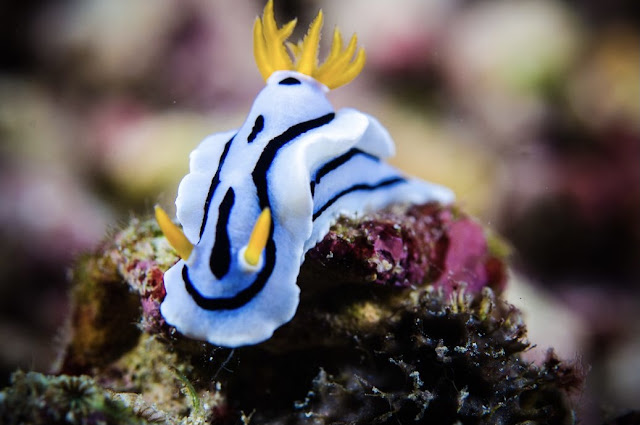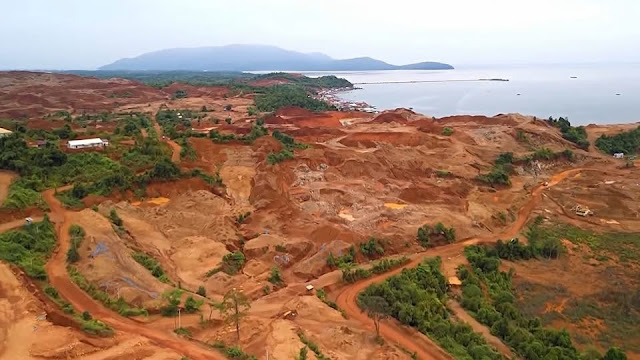Nickel mining in Sulawesi, Indonesia, is causing severe environmental destruction, including deforestation, water contamination, and a loss of biodiversity. The rise in nickel extraction, fuelled by global demand for lithium batteries and stainless steel, has resulted in the clearance of extensive rainforest areas and the pollution of rivers and coastal ecosystems.
Rob and Karen Oberg spent a year and 7,200 nautical miles crewing on other people's boats in SE Asia and Europe before cruising the Med for 2 seasons with crewmate, Marc Beerts, on a Jeanneau 43 DS, Alcheringa (Alcheringa is an Australian Aboriginal word meaning 'The Dreamtime'). On returning to Australia they acquired a Whitby 42 ketch, renamed her 'Our Dreamtime' and after cruising Australia's Great Barrier Reef extensively are now sailing in SE Asia. Total sea miles to date = 24,273 NM.
Dreamtime Sail

Friday, 18 April 2025
This is the reality of living green - Sulawesi Indonesia Nickel Mines
Sulawesi, resembling a curling starfish in the Pacific Ocean, is one of the most beautiful and resource-rich islands in the Indonesian archipelago. This island boasts approximately 6,000 kilometers of coastline and a diverse mountainous landscape, shaped by the volcanic “Ring of Fire,” where the Eurasian and Indo-Australian tectonic plates converge. Its mountainous and mangrove forests, along with its sea and coral reefs, are home to unique plant and animal species found nowhere else in the world.
Protected regions like Lore Lindu National Park and Morowali Nature Reserve host rare endemic species, including the one-meter dwarf buffalo and the tarsier. Numerous Indigenous communities, such as the Lauje in Central Sulawesi's mountains and the Taa Ta Wana, have historically used their ancestral lands sustainably.
These Indigenous groups rely on the forest's bounty, selling products like cinnamon, rattan, and resin, while the rivers are abundant with fish. Unfortunately, many forests are being cleared, waters are becoming polluted, and landslides are burying fields. Sulawesi's wealth in gold, copper, nickel, iron, sand, and limestone is drawing investors, but the extraction of these resources is undermining local livelihoods.
The landscape of Sulawesi has dramatically altered as the demand for nickel and cobalt surged with increasing digitalisation, the emergence of electric vehicles, and the global need for more stainless steel. Take a look around, and you'll find everyday items you have containing base metals sourced from this damaging mining in Sulawesi. Indonesian nickel primarily contributes to stainless steel production, but as the world shifts towards greener transportation, there is an increasing demand for nickel in electric vehicle batteries. Nickel is a vital alloy in stainless steel, which is utilised in various products, from kitchen tools to construction materials and industrial machinery.
In January 2014, the Indonesian government imposed a ban on exporting various mineral ores, including nickel, to foster local smelting industries. This ban was lifted in 2017, allowing mining companies to export ore until 2022, but the deadline was pushed to January 2020. Initially, this ban caused the global nickel price to rise by 8.8%, reaching a five-year high.
Indonesia stands as the world's largest nickel producer, with around 1.6 million tonnes of nickel produced in 2022, up from 1.04 million tonnes in 2021. In comparison, global nickel production reached about 3.3 million tonnes in 2022.
We found ourselves conflicted when witnessing these realities. Having just visited lush green rainforests where people thrived off the land and sea, we were now faced with barren land where rainforests had been violently uprooted, leaving behind stark red scars. Earthworks had created landing ramps extending over the coral reefs, where barges were loaded to capacity. Smelters were emitting pollutants that contaminated everything within miles, while waste byproducts flooded once-crystal-clear waters where locals still fish for their meals. This situation is alarming, and we recognise that the Indonesian people need employment.
We spoke to fishermen who can no longer fish and has been forced to work in the mines due to the scarcity of fish. Although they disagree with what is happening in their country, they have no choice but to endure terrible working conditions to provide for their families. Typically, this population does not vocally criticise government decisions, yet many activist groups are advocating for change.
The operation of these mines and smelters left us cold; the country and its people are being exploited. No one benefits—the people, the environment, businesses, or the eco-conscious world we all aspire to inhabit.
This is the reality of living green. 🥹
Subscribe to:
Post Comments (Atom)















No comments:
Post a Comment
We love to read your comments regarding our blog, what you enjoyed and what you might like to see more of. Please leave us your thoughts.